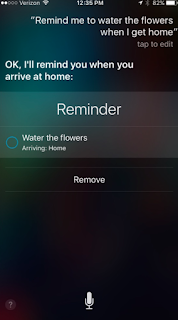 Here is a simple and easy to use, time saving feature that many people haven't set up on their smartphone: use geolocation reminders. Simply put, you can dictate a reminder which will appear on your phone when you arrive at home. For example, "Remind me to take the steak out of the freezer when I get home" or "remind me to water the flowers when I get home." Whatever you want to remember but don't need to think about until you get there, you can use geolocation reminders. You can also set geo reminders for your workplace, and (although I haven't) set them for specific places like your local grocery store. You can find nice, detailed instructions for iPhones here on how to do this. Geolocation reminders work on Droids, too. Note that you can set reminders for times, too, which also are helpful, such as "Remind me to call my wife at four."
Here is a simple and easy to use, time saving feature that many people haven't set up on their smartphone: use geolocation reminders. Simply put, you can dictate a reminder which will appear on your phone when you arrive at home. For example, "Remind me to take the steak out of the freezer when I get home" or "remind me to water the flowers when I get home." Whatever you want to remember but don't need to think about until you get there, you can use geolocation reminders. You can also set geo reminders for your workplace, and (although I haven't) set them for specific places like your local grocery store. You can find nice, detailed instructions for iPhones here on how to do this. Geolocation reminders work on Droids, too. Note that you can set reminders for times, too, which also are helpful, such as "Remind me to call my wife at four."
The main idea is, of course, to remember something, but the added bonus is that you can task your phone with the work of both recording it and reminding you. Recently I heard about some research that points out we can only keep four things in our brain at a time, so this is a way to help declutter your mind and keep room available for other, bigger things that need your attention. I also have mentioned suffering from Dementia of the Preoccupied, and this helps with that, too.
I also have written about the Things program in the past, which I use for organized to do lists. One of the many features I like about this program is that any dictated reminders get put in the Things inbox so I can move them to a list later and not forget about them.
Take time today to get your smartphone set up and take advantage of this helpful feature. I hope you will find it as helpful as I have!
Take time today to get your smartphone set up and take advantage of this helpful feature. I hope you will find it as helpful as I have!


